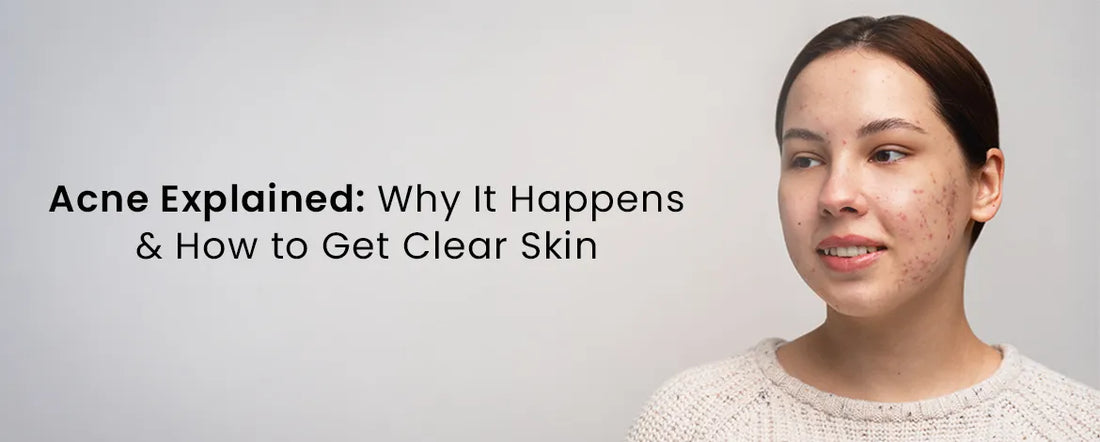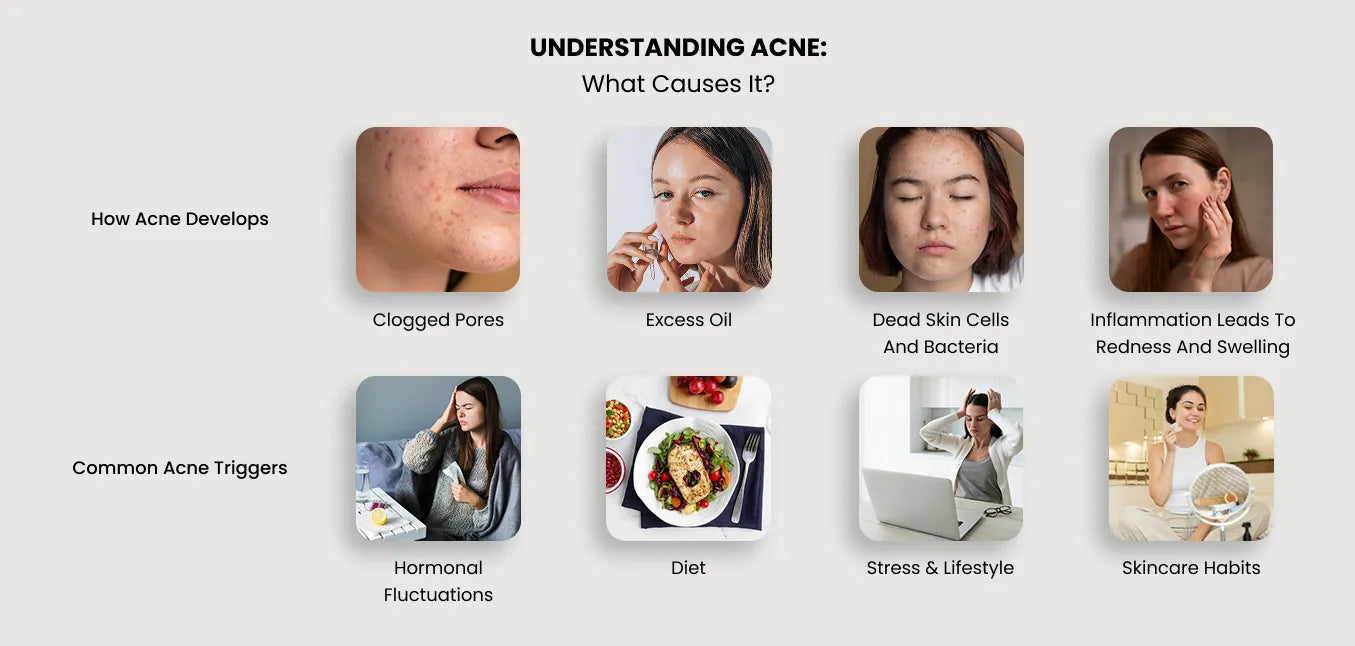
Acne Explained: Why It Happens & How to Get Clear Skin
By: Sandip KumarTable of Contents
Acne is more than just a skin concern, it’s a confidence crusher that affects nearly everyone at some point, from stubborn teenage breakouts to frustrating adult flare-ups. But what if you could crack the code to clearer skin? Whether your acne stems from oily T-zones, dryness-induced irritation, or sensitive skin’s overreactions, the solution starts with understanding your skin’s unique needs. This guide cuts through the confusion, revealing the science behind breakouts and how to combat them with targeted, skin-smart strategies.
Understanding Acne: What Causes It?

How Acne Develops
Dry skin can be a hidden cause of acne, as dehydration weakens the skin's barrier, leading to irritation and breakouts, especially when over-exfoliation strips moisture. To combat this without clogging pores, use lightweight, non-comedogenic hydration like the FCL Hydrating Moisturizer, which replenishes moisture while keeping acne-prone areas clear.
- Clogged pores from excess oil, dead skin cells, and bacteria.
- Inflammation leads to redness and swelling.
Common acne triggers
Hormonal Fluctuations: Changing hormone levels during puberty and menstruation along with pregnancy and hormonal diseases will increase the production of face oil.
Diet: An abundance of dairy products along with processed foods and sugar items may trigger acne breakouts.
Stress & Lifestyle: The combination of stressful life habits along with sleep problems combined with unhealthy decision-making tends to increase acne severity.
Skincare Habits: Unsuitable skincare products combined with excessive exfoliation irrigates the skin to activate breakouts.
Discover expert tips to manage hormonal acne and achieve clear skin with FCL Skincare’s recommendations: Read More
Acne & Skin Types: Why It Happens

Oily Skin - The Overproduction of Sebum
Oily skin produces excessive sebum therefore people who have this skin type, experience frequent breakouts. A person must control oil production by using a mild exfoliating cleanser.
Dry Skin - The Hidden Acne Culprit
Dry skin, often caused by dehydration, can unexpectedly trigger acne. When the skin lacks moisture, its protective barrier weakens, leading to irritation and breakouts—especially if harsh exfoliation further strips hydration.
Combination Skin – The Balancing Act
Combination skin has both oily and dry areas. Treat oily zones (like the T-zone) with acne-fighting products. Hydrate dry patches with lightweight moisturizers. Balance is key—control shine without over-drying.
The goal? Clear breakouts without compromising your skin’s moisture balance.
Sensitive Skin – Prone to Inflammation & Breakouts
Sensitive skin overreacts to common ingredients, turning routine products into triggers for redness, irritation, and acne. Niacinamide (vitamin B3) emerges as a hero ingredient—it calms inflammation, strengthens the skin barrier, and reduces breakouts without provoking sensitivity. For reactive skin, simplicity and anti-inflammatory actives are key.
How to Get Clear Skin: Effective Solutions for Every Skin Type
Acne-prone skin requires a consistent, targeted approach to stay clear and balanced. Whether you're dealing with occasional breakouts or persistent acne, this step-by-step routine will help control oil, prevent clogged pores, and promote healing—without over-drying your skin.
Essential Skincare Routine for Acne-Prone Skin

Step 1: Cleanse - Remove Oil & Impurities Gently
Washing your face twice daily is essential—but harsh cleansers can strip your skin, making acne worse. Instead, use a gentle, pH-balanced cleanser that removes excess oil without irritation.
Best Pick: FCL Alpha Beta Acne Cleanser – Helps unclog pores and prevent pimples
- Contains salicylic acid to unclog pores
- Prevents new breakouts while keeping skin calm
- Non-drying formula suitable for daily use
Pro Tip: If your skin feels tight after washing, switch to a cream-based cleanser for mornings and use an acne-fighting wash only at night.
Step 2: Treat - Target Breakouts & Prevent New Ones
After cleansing, apply a treatment serum with active ingredients to kill acne bacteria, reduce inflammation, and speed up healing.
Best Pick: Alpha Beta Gel – Best serum for acne-prone skin, enriched with Salicylic Acid & Niacinamide.
- Salicylic Acid – Exfoliates inside pores to prevent clogs
- Niacinamide – Reduces redness and regulates oil
- Lightweight, fast-absorbing texture
Pro Tip: If you have sensitive skin, apply the treatment every other night at first to avoid irritation.
Step 3: Moisturize - Hydrate Without Clogging Pores
Many acne sufferers skip moisturizer, thinking it will make skin oilier—but dehydrated skin actually overproduces oil, worsening breakouts.
Best Pick: FCL Hydrating Moisturizer – Provides lightweight hydration without clogging pores.
- Oil-free & non-comedogenic
- Contains hyaluronic acid for deep hydration
- Strengthens the skin barrier to prevent irritation
Pro Tip: If your skin is both oily and flaky, try a gel-cream moisturizer for balanced hydration.
Step 4: Protect - Shield Skin from Sun Damage
Acne treatments (like salicylic acid) make skin more sun-sensitive, leading to dark spots. Always finish with a lightweight, acne-safe sunscreen.
Best Pick: FCL SPF 40 Sunscreen Sensitive and Acne Prone – Sun protection without irritating acne-prone skin.
- Mineral-based (zinc oxide) – Less irritating than chemical sunscreens
- Non-greasy & matte finish – Won’t clog pores
- Calms redness while protecting against UV rays
Pro Tip: Reapply sunscreen every 2-3 hours if you’re outdoors or near windows.
Beat summer acne with an effective skincare routine—get expert tips from FCL Skincare: Read More
Extra Treatments for Stubborn Acne

Spot Treatment – Zap Pimples Overnight
For sudden breakouts, a high-concentration treatment can shrink pimples fast.
Best Pick: FCL Spot Corrector – Anti-acne gel for oily skin
- Dries out pimples overnight
- Reduces swelling and redness quickly
How to Use: Apply a tiny dab directly on spots before bed.
Exfoliation – Fade Acne Scars & Prevent Clogs
Dead skin buildup = clogged pores. Chemical exfoliants (AHAs/BHAs) work better than scrubs for acne-prone skin.
Best Pick: FCL Penta Peel – A gentle home chemical peel with Glycolic Acid for acne scars.
- Glycolic Acid + Lactic Acid – Smooths texture & brightens scars
- Gentle enough for 2-3x weekly use
Pro Tip: Avoid physical scrubs—they can irritate active acne and spread bacteria.
Acne-Fighting Mask – Control Oil & Calm Inflammation
A weekly clay or sulfur mask helps absorb excess oil, unclog pores, and reduce redness.
How to Use: Apply 1-2x a week on oily areas (T-zone) only.
Bonus Tips: What to Avoid If You Have Acne-Prone Skin

- ❌ Harsh scrubs (they irritate and worsen breakouts)
- ❌ Heavy creams & oils (can clog pores)
- ❌ Alcohol-based toners (strip skin, causing rebound oiliness)
- ❌ Picking at pimples (leads to scars & longer healing)
Lifestyle & Dietary Adjustments

- Lower your consumption of dairy goods and sugar with processed foods in addition.
- Drinking enough water alongside creating regular nightly bedtimes benefits skin health.
- Stress management occurs with exercise practices combined with meditation and hobbies.
Professional Treatments & When to Seek Help

- Acne needs immediate attention from a dermatologist whenever the symptoms prove severe or persistent.
- Acne treatment at an advanced level consists of chemical peels alongside prescription drugs together with laser therapy.
Learn how to care for acne-prone skin with expert tips and dermatologist-approved solutions in this FCL Skincare guide: Read More.
Conclusion
Thorough skincare success depends on the correct identification of your skin type together with a daily routine along with specific changes to your lifestyle habits.
Dermatologist-endorsed products combined with their skincare recommendations help people control acne and preserve their skin health.
Acne-prone skin needs dermatologist-approved treatments which you can find at FCL Skincare.
Your journey to clear skin begins today—scroll down to unlock your personalized acne-fighting plan! Explore FCL Skincare’s dermatologist-recommended acne care range for clear, healthy skin: Shop Now.
FAQs
-
Which serum is best for acne-prone skin?
The best choice for acne-prone skin is FCL Alpha Beta Acne Gel which works effectively for this skin type. It combines Niacinamide with Salicylic Acid to reduce breakout occurrences and minimize inflammation. -
What is the best face wash for acne and pimples?
The FCL Alpha Beta Acne Cleanser serves as an effective facial cleanser that deeply penetrates the skin and clears pores to avoid acne outbreaks while maintaining sensitivity. -
What is the best gel for acne?
The FCL Spot Corrector functions as a quick-acting anti-acne gel that fights acne breakouts through the night while scar reduction takes place. -
Does Salicylic Acid really help with pimples?
Salicylic Acid demonstrates its potency by clearing pores together with anti-inflammatory properties that stop new acne formation making it suitable for dealing with pimples. -
What is the best face mask for acne?
When choosing a face mask for acne treatment the FCL Penta Peel stands as the top option because it provides mild chemical exfoliation to combat oil along with pore unclogging and acne scar fading benefits over extended use periods.